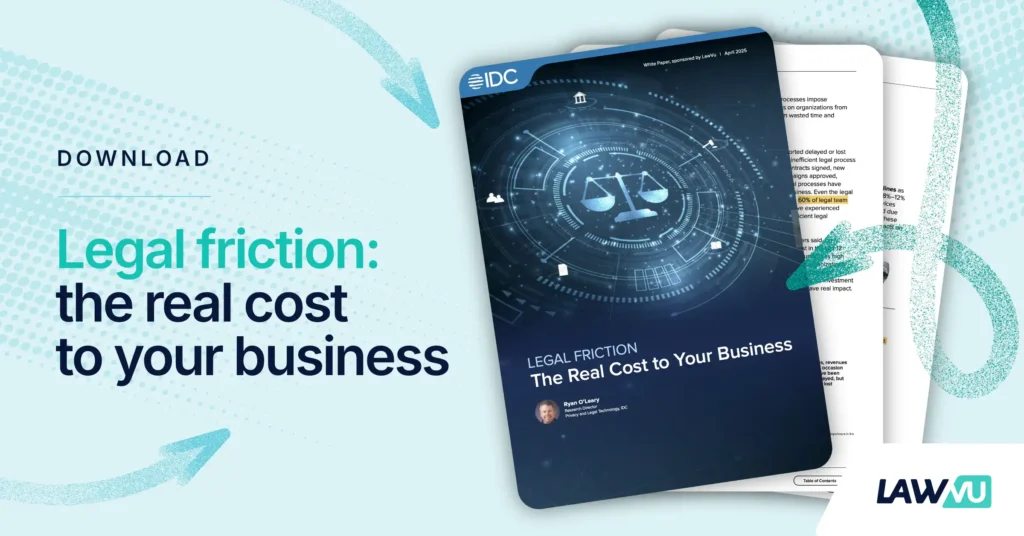5 ways a legal workspace can reduce legal friction for your business
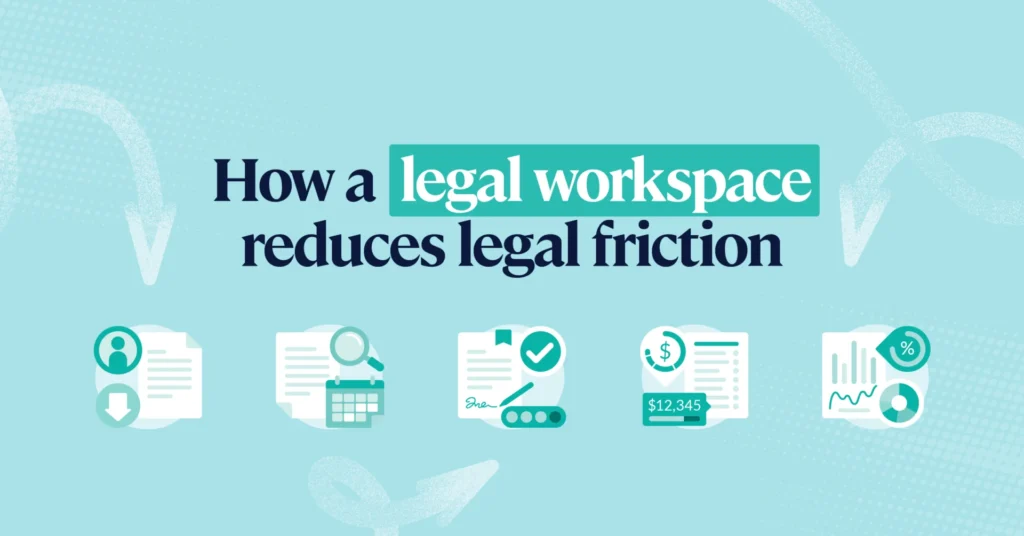
A well-optimized legal team acts as an accelerator for the business: supporting core functions, unlocking opportunities to scale, and driving strategic outcomes. That’s why corporate legal departments are integral partners to their organizations. With the right operational and technological foundations, legal can become a key driver of revenue and a source of competitive advantage.
Yet recent research conducted by the International Data Corporation (IDC) reveals that legal friction prevents functions from achieving operational excellence and contributing maximum value. Luckily, that same research shows that investment in operations – people and process – with technology at its core provides a clear path to better business outcomes.
However, not all technology is created equal – and at a time when operational excellence is critical and legal leaders need to thoughtfully invest in in-house legal technology, a legal workspace has proven to be the best way to increase efficiency, deliver better legal service and amplify business outcomes.
So you can be confident about making the right decision when it comes to investing in legal technology, this article explores how a legal workspace reduces legal friction for in-house legal teams.

From friction to force multiplier
With practical tips on evaluating and adopting legal tech. Hear from industry experts and learn how modern legal teams use tech to reduce friction and drive better business outcomes.
What is legal friction?
Simply put, legal friction is the drag created by inefficient legal processes – which slows down operations, restricts the legal team’s ability to act strategically, and negatively impacts overall business performance. It also contributes to negative experiences or interactions between the wider business and legal departments.
For a free downloadable cheat-sheet on legal friction, click here.
What is a legal workspace?
A legal workspace is a unified platform built specifically for in-house legal teams where all legal work – matters, contracts and spend – is managed in one place with integrated intake and analytics features. By comparison with other offerings on the market, a workspace approach delivers unparalleled operational efficiency and ROI.
As you continue through this article, we’ll use the LawVu legal workspace as an example and explore how it delivers unique value and efficiency for in-house legal teams as well as operational excellence.
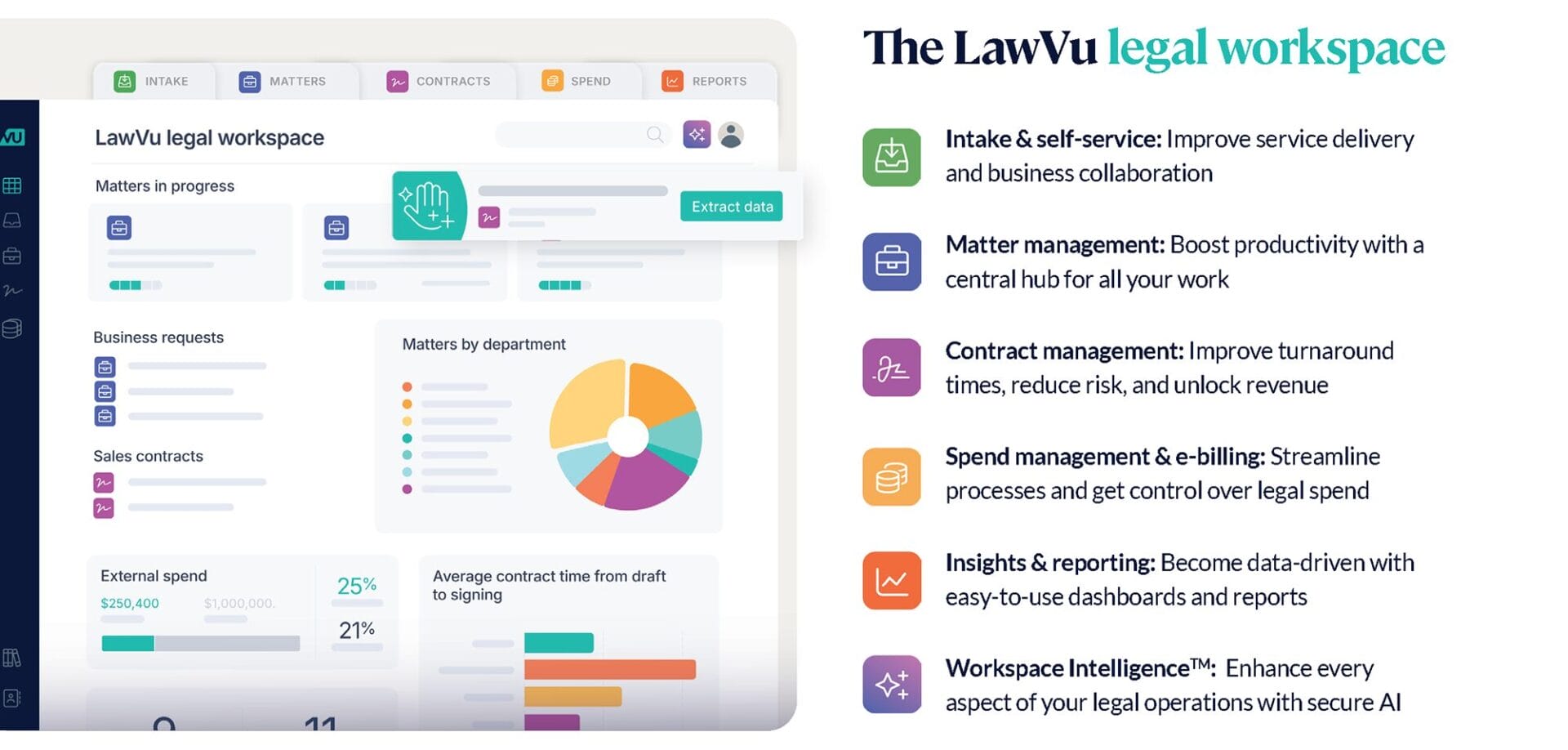
How a legal workspace can reduce legal friction for an organization like yours
Manual, time-consuming tasks are one of the key causes of legal friction for in-house legal teams, with 83 percent of legal professionals saying that administrative work hinders their ability to focus on strategic priorities.* On average, legal teams spend more than one day per week on tasks such as email searches, managing invoices, contract reviews, and approvals. That’s time and energy lost to inefficiency.
Alarmingly, IDC estimates that organizations lose up to USD $300,000 annually in potential productivity from excessive manual work.* This not only strains resources but also slows down legal processes and makes legal teams less cost-efficient.
Here’s how a legal workspace can streamline common workflows and remove legal friction:
At a high level, a legal workspace automates and streamlines workflows, speeds up legal processes and reduces manual involvement, giving in-house legal teams the time to do more strategic work and creating more effective interactions with the business. No matter which workflows you’re tackling, you’ll benefit from:
- Centralized information: With legal projects, matters, invoices, agreements, documents and knowledge, invoices and interactions with outside counsel in one place, you can say goodbye to endless email searches and inefficient communications.
- Workflow automation: Automating assignments, review and approvals, RFP requests, budget updates, reporting and other routine tasks eliminates repetitive work and speeds up cycle times.
- AI-powered productivity: Integrated AI further reduces repetitive low-value tasks, speeding up daily operations and enhancing valuable data capture.
- Insightful, easy–to-use reporting: While you manage your workflows in LawVu, valuable data is captured without additional effort and turned into highly usable dashboards and reports – for all your legal work in one place.
Operationally speaking, a legal workspace enables even more efficiency and value, reducing legal friction
While an individual point solution can make one specific workflow more efficient – for example, a contract management solution helps reduce manual tasks and inefficient processes when it comes to contact lifecycle management, a legal workspace allows you to address friction across multiple workflows by:
- Eliminating inefficiencies that result from jumping between systems and consolidating data from multiple sources.
- Providing your business with one single go-to platform to engage with legal, increasing adoption and scaling service.
- Removing operational overhead by having one single subscription, one tool to implement and adopt, and the ability to scale and add more services over time.
Now that we know more about what a legal workspace is, let’s explore the specific ways a legal workspace can reduce legal friction.
1. A legal workspace streamlines contract management workflows, reducing legal friction
Over two-thirds of organizations report delayed or lost revenues due to inefficient or ineffective legal processes, including contract workflows, and legal team members report spending close to two hours a day drafting or reviewing low-risk routine contracts.* With contracts being a vital part of most business operations, and contract management making up a significant portion of the workload for in-house legal teams, the legal friction created by ineffective contract management is costly in terms of both the legal team’s time and the commercial impact.
To combat this, let’s investigate how contract management in a legal workspace such as LawVu can reduce legal friction:
- Centralized contract repository with automated obligation management: Having all your agreements in one location reduces time wasted on searches, manual communications and data entry; it generates reliable reminders of obligations without human intervention – saving time and reducing the risk of lost revenue.
- Embedded AI for speed: Generating contract summaries, finding key terms during analysis and review, and making key dates actionable are just some of the recurring tasks that AI can make much more efficient for workspace users.
- Automated assignment, review and approval workflows: These features ensure contracts make their way through critical steps and adhere to policies without anyone wasting time on manual tasks.
- Self-service contract creation: Legal teams don’t need to spend hours drafting simple, routine agreements. With self-service tools, business users can draft their own contracts using pre-approved templates and wizards. This reduces legal’s involvement in low-risk tasks and enables the business to operate with agility.
With a legal workspace like LawVu, inefficiencies that are a drag on legal and commercial operations can be cut, improving outcomes across the board – all while avoiding one of the biggest sources of legal friction and boosting your bottom line.
“LawVu helped us recognize how much time we’re actually spending on things and where our time is best spent moving forward. And we’ve reduced our contract review response time by five days.” Scott Millea, General Counsel, Northern Tools
If you’re curious to know more about contract management in the LawVu legal workspace, take a look at this on-demand demo.
2. A legal workspace with matter management at its core, improves productivity business-wide and reduces legal friction
While the benefits of better contract management are understood across the business, contracts take up only a fraction of most legal teams’ time. Yet, few in-house legal teams use dedicated matter management software or tools that manage both contracts and matters together. Many legal teams still rely on email, spreadsheets, or software that is not representative of all the work in-house does. This burdens legal teams with manual tasks, meaning they are unable to access the data needed to work strategically or to show their value – ultimately creating legal friction.
That’s why the core of a legal workspace (like LawVu) should be robust matter management capabilities, designed to support internal workflows and legal project management and further reducing legal friction with:
- Comprehensive features for end-to-end legal matter management in a secure shared space: Structured intake and automating triage to get work to the right people faster, and embedded collaboration and task management features keeps legal teams from wasting time on manual workflows, creates control, fosters teamwork and ensures business continuity.
- Built-in document and email management: Robust support for document and email capture, management and search mean all essential documents are securely stored and easily accessible whenever needed.
- Seamless integrations: Legal teams and the business should be able to use several tools daily, all in the one legal workspace with out-of-the-box integrations with common tools such as Gmail, Outlook, Slack, Teams, and the likes of SharePoint and Salesforce to support collaboration, centralize data and create extra efficiencies for everyone involved.
“A key motivation of going in-house is to be a part of an organization — to get to know the business and create close working relationships with colleagues and see how your legal advice, big or small, makes a difference on a daily basis… Having a matter management system frees up time for us to get on with this work and think about how we might do things better.” – Fiona McLeod, General Counsel, NCC
Given that legal teams’ report wasting hours each week searching for emails, managing team workflows, compiling data for reporting and jumping between systems to determine the status and priority of their work, an in-house legal tech solution with matter management at its core enables significant operational efficiency and, of course, reduces legal friction.
To learn more about matter management in a legal workspace, click here.
3. A legal workspace improves interactions between in-house legal teams and the wider business
With business leaders reporting lack of visibility, poor communications, insufficient data, inconsistent process and a lack of technology as contributing factors to legal friction, it is unsurprising that IDC reports* “negative interactions and slow workflows between the legal and other departments in the organization are commonplace.” Therefore, a valuable step in reducing legal friction should see legal teams seeking to create more bandwidth as a result of better business engagement.
Here’s how a legal workspace like LawVu reduces friction for in-house legal teams and the wider business:
- Streamlined intake and a “legal front door”: With multiple ways to funnel legal requests into a single place, LawVu’s flexible intake features let legal teams capture better instructions up front, reducing time-consuming back-and-forth with the business and slashing the time it takes to get work started. Plus, with a legal front door and a structured process, everyone knows how to get legal help when they need it.
- Visibility and collaboration: LawVu’s legal front door (called the LawVu Business Portal) is more than a simple ticketing portal; it’s a curated experience for business users, where they can track progress and use simple collaboration tools. This user-friendly service environment eliminates the “black box” perception of legal and reduces frustrating manual tasks like email status requests.
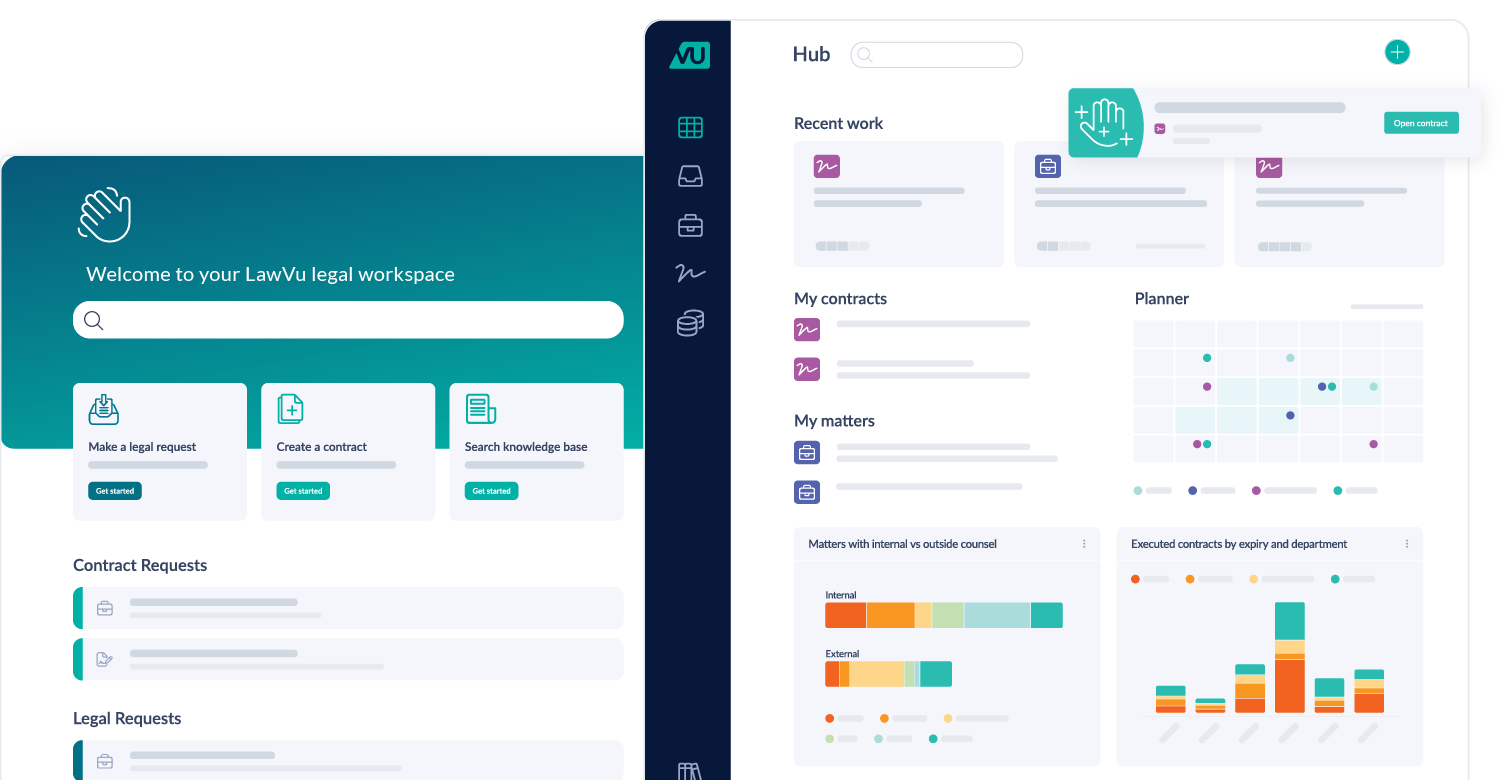
- Modern experiences for collaborative workflows, including mobile: Many legal workflows, such as contract approval or invoice sign-off, require interactions with business partners to move forward. Streamlining these interactions with mobile applications and great user experiences not only keeps work moving, but it also positions legal as a user-friendly and innovative team.
- Self-service: The LawVu Business portal isn’t just for raising legal requests, it’s also the portal to a legal knowledge base and a place for business partners to create and manage contracts on their own.
“The portal feels personal, and feedback from the business has been extremely positive. Business users quickly embraced the intake portal, which offered clear status updates, answers to frequently asked questions, and self-service tools like automated NDAs.” – Vera Corbett, General Counsel, Newcastle Greater Mutual Group
In-house legal technology such as a legal workspace, designed with the broader business in mind, offers a unique advantage. It makes legal services more accessible while empowering legal teams to serve as true business partners. By reducing legal friction, these tools free up time and capacity, enabling legal teams to focus on higher-value, strategic initiatives.
Click here to see a five-minute demo of the LawVu business portal in action.
4. A legal workspace addresses inefficient workflows with outside counsel
One of the costly impacts of legal friction is over-spending on outside counsel: in fact, IDC estimates up to USD $300,000 could be saved if bandwidth was available to handle the work in-house.*
While the increased cost of outside counsel is an outcome of legal friction, inefficient invoice processes, spend management and collaboration (or lack thereof) with outside counsel are often the root cause. So much so that legal teams report wasting almost three hours per week on low-value tasks like sending emails to different law firms for RFPs and updates, manually searching emails for advice from outside counsel, approving invoices and manual spend reporting.
Let’s investigate how spend management within a legal workspace like LawVu helps eliminate these points of friction:
- Automated invoice workflows with e-billing: When legal teams and their firms upload invoices to LawVu’s repository, they are already saving time and effort by creating a centralized repository for invoice and spend information. Even better, it opens the door to automating a myriad of time-consuming tasks like invoice review, approval, billing guideline evaluation, accruals management and budget tracking.
- Spend reporting and analytics at your fingertips: Out-of-the-box dashboards in a legal workspace like LawVu give in-house legal teams total visibility over spend and actionable data for decision-making, with almost no effort at all.
- An automated RFP process: Instead of spending time emailing firms and managing responses to get the best bids, legal teams using the LawVu legal workspace have a more effective, less time-consuming way to manage RFPs, select panels, manage scope and choose the right firm for the job.
“We were constantly overwhelmed with emails and struggled to organize information… the ability to track emails, manage tasks, deadlines and invoices is exactly what we were looking for. Now, we use LawVu to keep our department and all our work organized, including the work we do with Legal Service Providers, and our LSPs say the platform is easy to use which saves us time in the invoicing process.” – Bridget Fuller, Senior Legal Assistant, Nabholz Construction
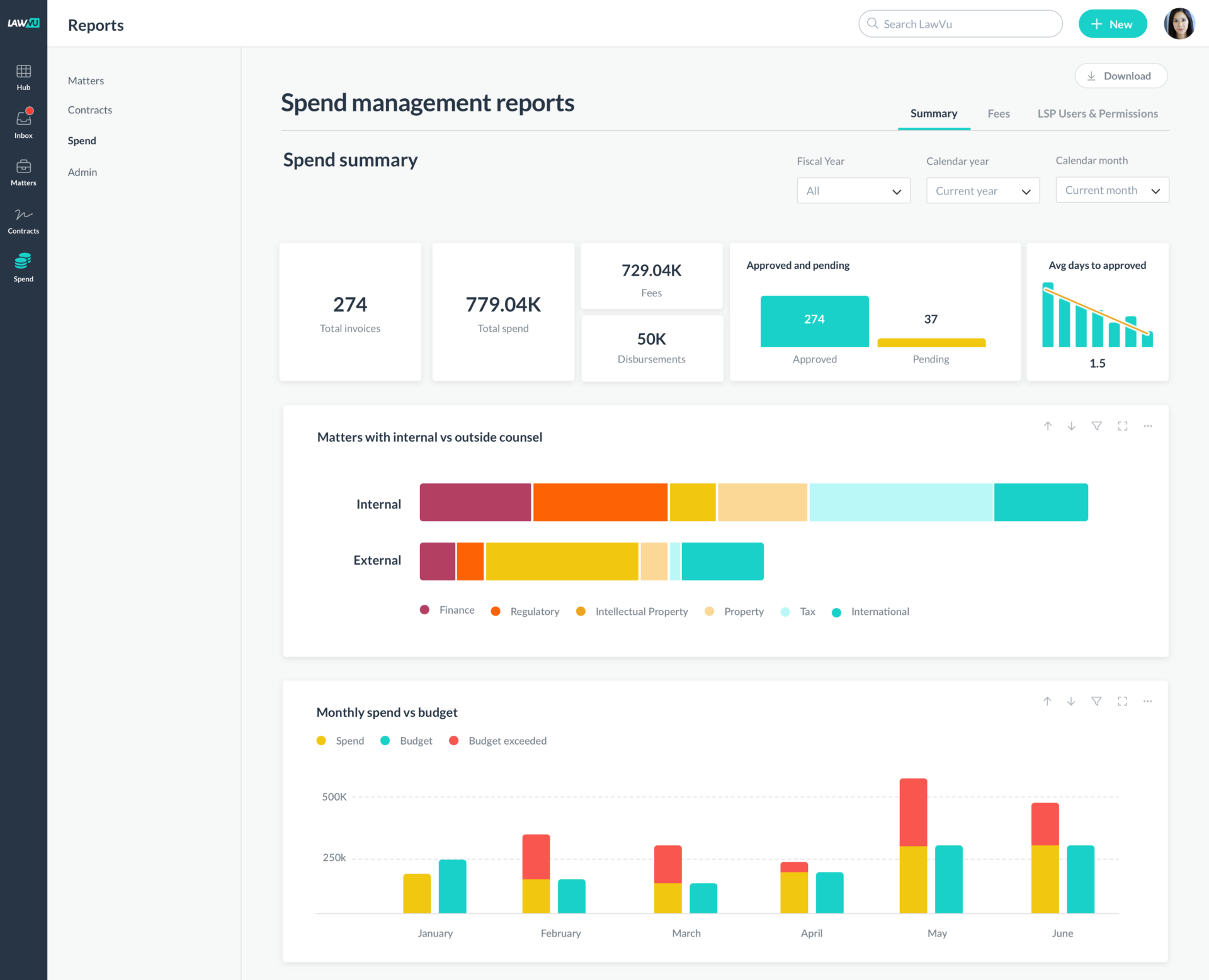
If you’re intrigued by how legal spend management works within a legal workspace, you can take a quick tour here.
5. Legal data and analytics for continuous improvement
Without effective in-house legal technology, a significant portion of organizations face challenges when it comes to attaining and using legal data: 38 percent of business leaders cite a lack of data to measure performance as a major pain point when working with their legal team and only 41 percent of legal stakeholders claim to have access to comprehensive data to evaluate their teams effectively.*
Here’s how a legal workspace can help your legal team access the analytics and reporting needed to show value and accelerate operational improvements:
- Continuous data collection: One of the most powerful aspects of in-house legal software such as LawVu’s legal workspace is that while you’re streamlining workflows and conducting day-to-day business, you’re capturing valuable data without any effort.
- Out-of-the-box analytics: With a legal workspace like LawVu, interactive dashboards and flexible self-service reporting data is easy to access, so you can answer key questions, demonstrate value and make data-driven decisions without special skills or time-consuming processes.
- Consolidated data means total visibility: Any data you can use to improve legal operations is useful, but barriers to obtaining a holistic view of the legal team’s operations and performance limit your ability to make meaningful operational improvements. A legal workspace like LawVu offers consolidated data for spend management, matter management, and contract management in one place.
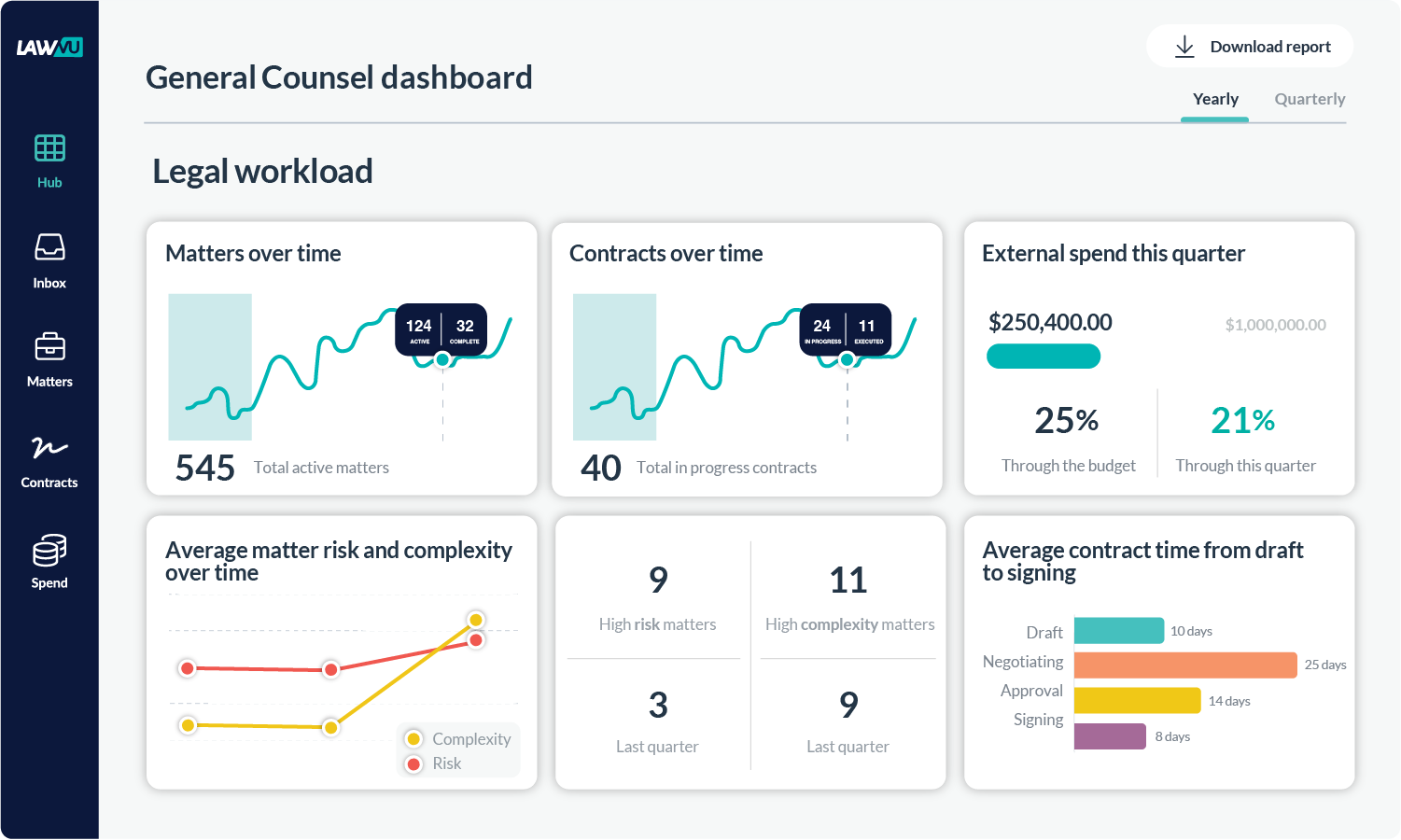
To learn more about insights and reporting in a legal workspace like LawVu, click here.
Taking the first step to solving legal friction with a legal workspace
By now you should have a sound understanding of how a legal workspace can reduce legal friction. To download your free copy of the IDC white paper, click here. Or, To calculate how much time and money a legal workspace can save your legal team (and the wider business), or how much value a legal workspace can generate, use this free calculator. Or, to learn more about the top features LawVu customers rely on to reduce legal friction, click here.
*Source: IDC White Paper, sponsored by LawVu, Legal Friction: The Real Cost to Your Business, #AP15041X, April 2025


